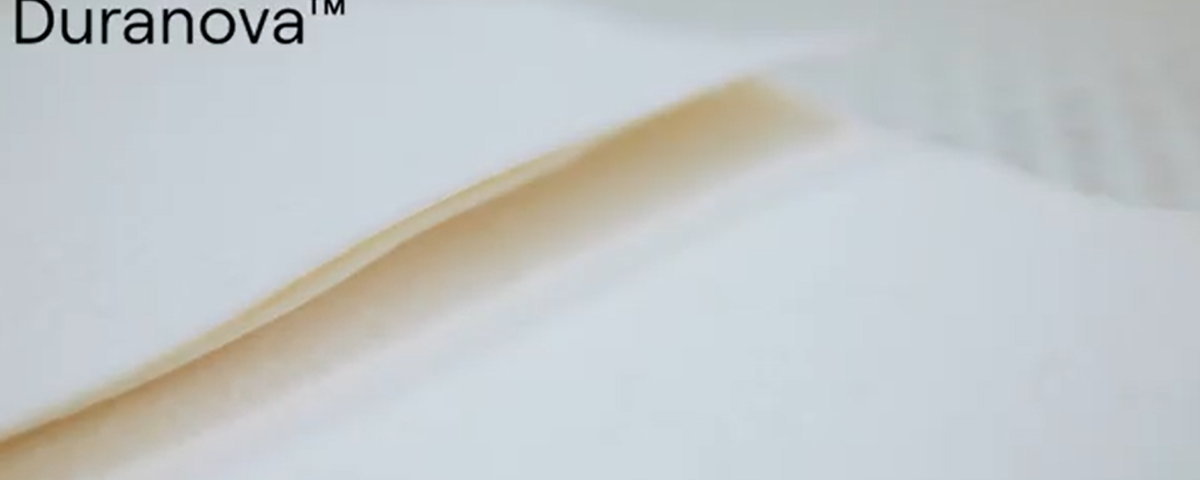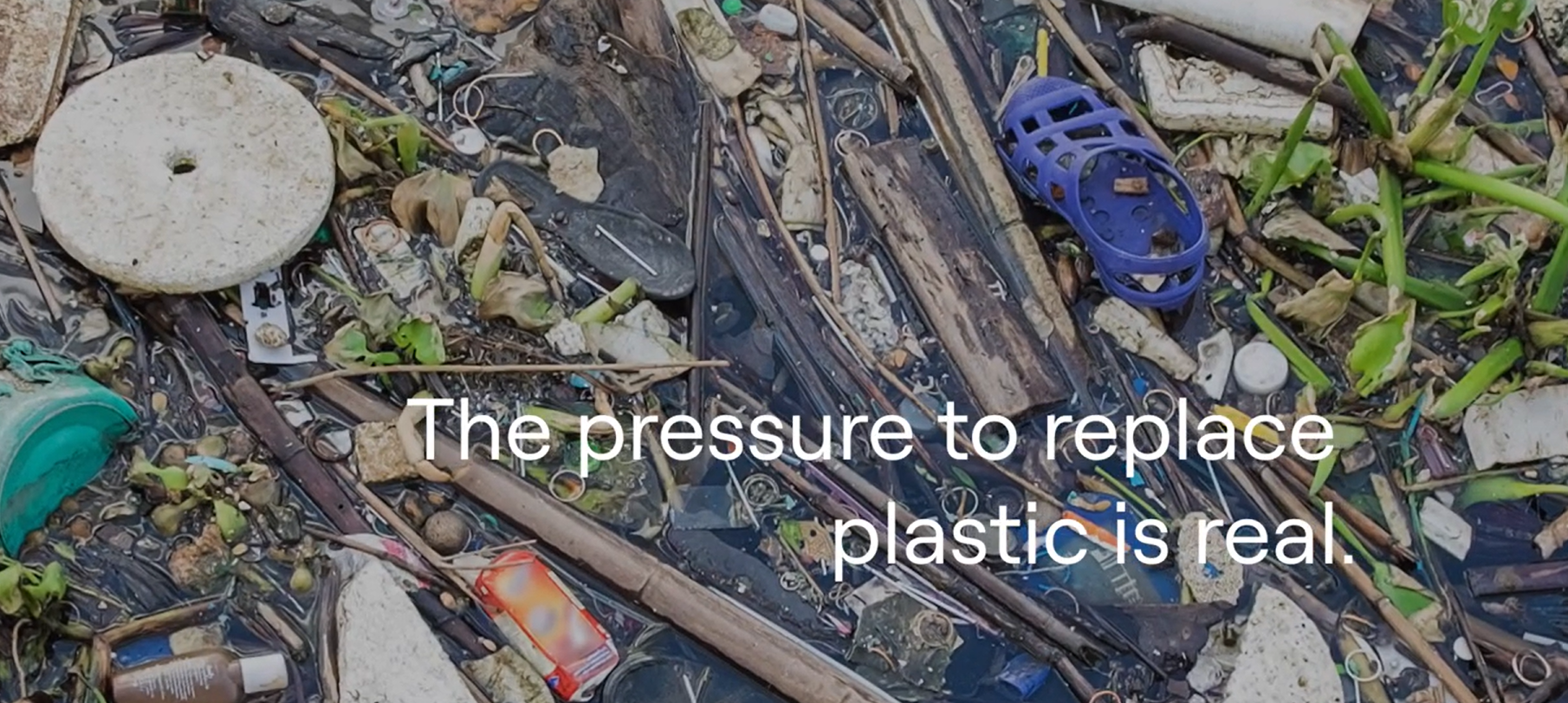




Keep this story going! Share below!
The solution Fiberdom provides is their super material called Duranova, which is made through a process of functionalizing wood fibers. The material is a pinnacle of wood fiber innovation combining circularity and functionality and is meant to reduce reliance of non-essential plastics. The innovation contributes to several SDGs, mainly SDG 14 (Life Below Water) through the reduction of plastics waste and SDG 12 (Responsible Consumption and Production) by promoting circularity and being a sustainable alternative to plastics.
To reduce reliance on non-essential plastics, Fiberdom, a Finnish company based in Vantaa, has developed Duranova, which is a material made by Fiberdom’s patented process of functionalizing wood fiber, making it more durable and highly versatile. The innovation has broad potential, as it could be applied in products ranging from cutlery to furniture, reducing plastic use across a wide range of products.
Fiberdom has a lot of experts in various fields in their team and that is how the innovation was made possible. The original founders of Fiberdom got the idea for the material in response to the EU’s Single-Use Plastics Directive, which was set to take effect in 2021. The initial goal was to replace plastic cutlery, but since then the concept has evolved significantly. Duncan Mayes, the current CTO of the company, was the main innovator. More about all this in the next section.
Duranova supports several SDGs. As an alternative to plastic, Duranova helps reduce the amount of plastic used in industries, lowers plastic waste, and offers a more circular material. This promotes sustainable consumption and production, aligning with SDG 12. Duranova’s natural decomposition helps reduce microplastic pollution in oceans, and by replacing single-use plastics often ending up there, it contributes significantly to SDG 14. Additionally, Duranova supports SDG 13 (Climate Action) and SDG 9 (Industry, Innovation and Infrastructure), as producing wood fiber-based materials emits less than conventional plastics. Offering a sustainable, bio-based material also fosters industrial innovation and supports the shift to low-carbon, resource-efficient manufacturing.

In our interview with the Executive Director of Fiberdom Tomi Järvenpää, he told us that the original inspiration for the innovation came about, because of The European Union’s Single-Use Plastics Directive was coming into force in 2021. The original founders of Fiberdom realised that this would mean that plastic cutlery would disappear from the market, therefore creating a market gap, which they felt they could fill.
Järvenpää explained further giving credits especially to one person, “I need to mention Duncan Mayes, he was the guy who got the question, OK how do we take wood fibers and pulp in particular and make cutlery out of it”. Mayes had a lot of previous experience with wood fibers beforehand, as he had worked on R&D department in one of the big forestry companies for nearly 30 years. Järvenpää told us, “He understands the wood fibers, he understands the chemistry relating to wood fibers – We need to give him credit for the actual innovation”.
The second phase of innovation in Fiberdom came about once Järvenpää started to work for the company. He wasn’t there for the initial phase. Järvenpää realised that the innovation could be taken further and utilized in other things beyond cutlery. In Järvenpää's own words “I was looking at the (production) line and figured, OK could we do something else than just the cutlery” and “That moment, was probably second sort of realization in our thinking, that hey, we can actually utilise this material to do 100 or 1000 different things”.
Fiberdom’s innovation Duranova has delivered immediate and long-term impact across environmental and business dimensions. The material addressed a clear regulatory gap created by the EU’s Single-Use Plastics Directive, which banned plastic cutlery in 2021. Their first product, single use cutlery, quickly gained traction in Finnish retail channels. This early success validated both the innovation’s market readiness and its alignment with sustainability goals, particularly SDG 12 and SDG 14, by reducing plastic waste and pollution and promoting circular material flows.
Duranova is on a long-term path to further evolve into a scalable solution with applications beyond cutlery, including packaging, furniture and food-contact materials. Its versatility, biodegradability, and renewable fiber base position it as a relevant enabler in the global transition away from fossil-based plastics. There is a growing demand for plastic-free solutions, and Fiberdom’s material not only supports Finland’s bioeconomy but also offers a globally relevant alternative to conventional plastics, making it a cornerstone in the transition to a more sustainable future. Further, the innovation contributes to climate and resource-efficiency targets by reducing carbon footprint and improving end-of life outcomes.
Retail adoption and positive life-cycle assessments have validated the material’s ability to replace fossil-based plastics without compromising functionality. Its adaptability ensures relevance in multiple sectors, making it not only a commercial success but also a part of advancing sustainable material transition worldwide.
Fiberdom’s innovation Duranova delivers substantial business benefits across multiple dimensions. The company’s first product, single-use cutlery, was developed in response to the EU Single-Use Plastics Directive and quickly gained traction across major Finnish retailers and B2B channels. This early success validates the material’s compliance, performance and cost effectiveness, proving its viability.
Beyond initial commercialization, Fiberdom’s business model evolved rapidly. The realization that their fiber functionalization process could be applied beyond cutlery led to a strategic pivot toward broader usage of the material. This opened up new applications in packaging, furniture, and food-contact materials. For instance, the partnership with Kiefel, a global market leader in sustainable thermoforming based in Germany, validates the scalability and industrial relevance of Duranova, unlocking new markets and manufacturing efficiencies.
Fiberdom has also attracted significant funding signaling strong confidence in its technology and material. Invitations to collaborate with billion-euro companies further demonstrate industry recognition and demand for their solution. The company is well-positioned for long-term growth. Market forecasts predict fiber-based packaging sector growing to 493 billion euro by 2034. Fiberdom is targeting €40 million net sales for their material by 2030, with Finland as their launchpad for international growth. They aim for 1-2% market penetration through strategic partnerships and technology licensing.
Fiberdom is one of the companies trying to find an answer for a plastic free future. This year alone over 400 million tons of plastic will be produced, mostly because of habit, cost and convenience. Only about 10% of this plastic is being recycled. The rest pollutes landfills, oceans, and food chains, harming animals, habitats, and people. This underscores the urgent need for biodegradable alternatives.
This innovation impacts both the environment and the people living in it. Having more biodegradable options for plastic is essential for different animals, nature and different habitats around the globe. Plastics cause severe ecological damage: animals suffer from ingestion and entanglement, while microplastics degrade ecosystems and infiltrate human food, water, and clothing, posing health risks. Unlike traditional plastics, Duranova decomposes naturally, preventing microplastics from entering ecosystems and human bodies. This benefits not only the environment but also public health and future generations.
Fiberdom’s biodegradable material helps reduce global plastic pollution and offers a timely response to growing demand for sustainable materials. Duranova is based on a technology that uses wood pulp as their source so it can transform our forestry industry as well. Finland is fairly well-known for our forest industry and also the troubles that come along side it. If Fiberdom’s innovation is developed and scaled responsibly, it could shift resource use from traditional, resource-intensive models to circular, value-added applications. The impact is therefore both local and global: supporting Finland’s bioeconomy while reducing plastic waste worldwide.
Get stories of positive business innovations from around the world delivered right to your inbox.
Fiberdom’s business is about providing a solution to the increasing demand for sustainable material alternatives for plastics, by developing a material as durable as plastic, while being more environmentally friendly at the same time. Fiberdom’s innovative material called Duranova serves many different industries as it is applicable for many different products. These include cutlery, packaging, furniture, etc. made of the material.